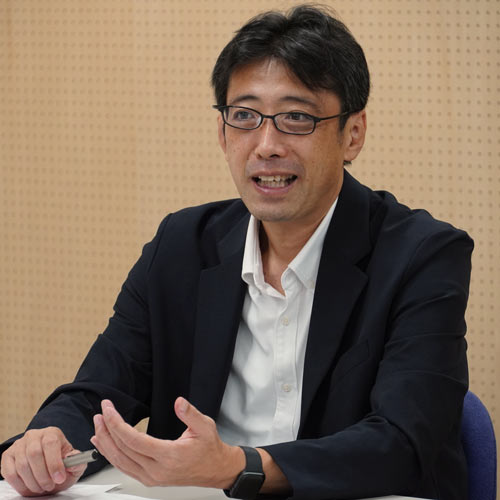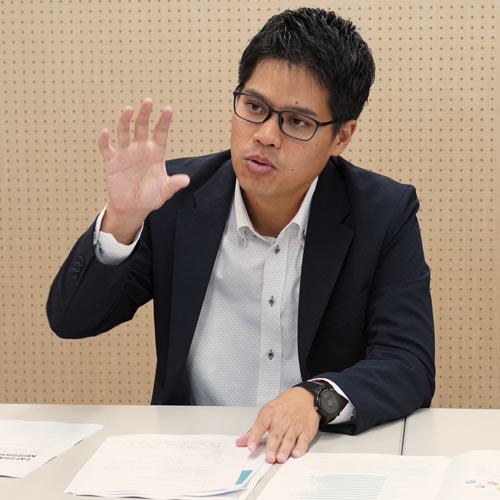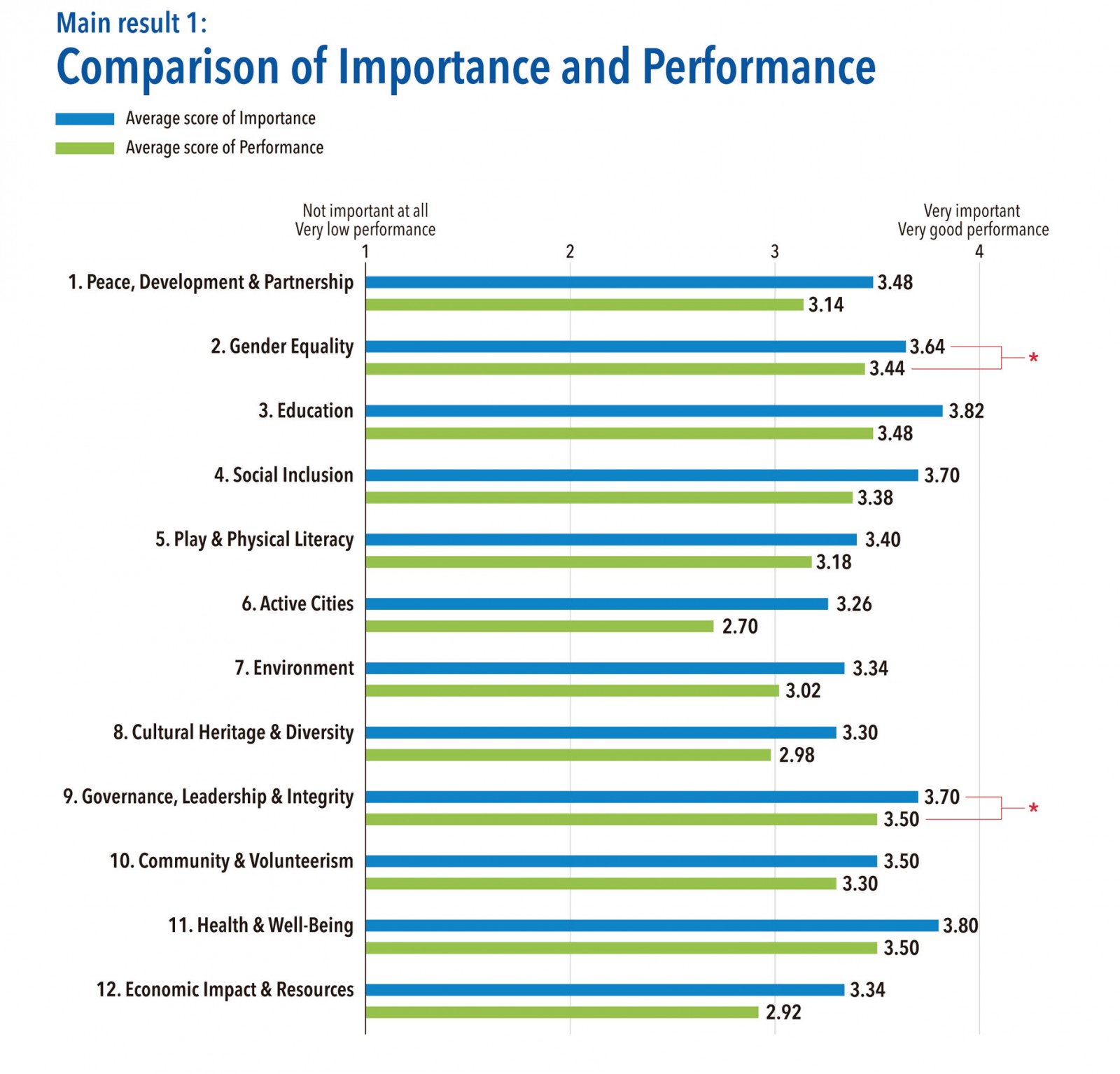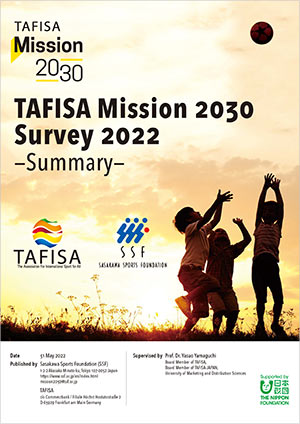What Is TAFISA Mission 2030?
The Association For International Sport for All (TAFISA) currently has more than 380 member organizations in 170 countries and regions worldwide. TAFISA is the leading international Sport for All organization that addresses social issues by promoting Sport for All and physical activity in cooperation with the World Health Organization (WHO), International Olympic Committee (IOC), United Nations Educational, Scientific, and Cultural Organization (UNESCO), and other international institutions. The Sasakawa Sports Foundation is a member of TAFISA through its participation in TAFISA-Japan, which was established in 1992, and the SSF’s Max Tamazawa was newly elected to the TAFISA Board of Directors in June 2022 for a three-year term.
TAFISA Mission 2030 was adopted by the TAFISA General Assembly in Seoul, South Korea, on November 16, 2017. It is a guiding document for a global strategy to promote Sport for All and physical activity. It also introduces critical issues the world is facing based on 12 key themes and how to maximize the contributions of Sport for All in achieving a better world by 2030.
MAX TAMAZAWA: Referencing the UN Sustainable Development Goals (SDGs), TAFISA Mission 2030 is a roadmap to creating a better society through sports by the target year of 2030.
TAFISA examined what Sport for All can do to address the many critical issues the world is facing and came up with 12 key themes on which to focus its efforts. For each of those themes, TAFISA Mission 2030 contains a “Vision Statement,” “State of Play,” “What Can Sport for All Do to Help?” and “Our Mission 2030.”
While TAFISA had been working for years to build a “Better World Through Sport for All,” we needed to establish more concrete guidelines on the kind of actions required to reach this goal and to share them with all TAFISA member organizations.
TAFISA Mission 2030 Survey 2022: A First Step in Monitoring Progress
TAMAZAWA: While TAFISA Mission 2030 outlines the key themes we need to tackle, simply publishing a program of action isn’t enough to achieve our goal of a building a better world. We needed to make sure that all members were on the same boat.
That said, the financial and human resources at one’s disposal differ from one member organization to another, as do the social challenges they face. In Japan, for example, which is facing a hyper aging society, our focus is on encouraging older people to remain active through sports and other physical activities so as to keep a lid on rising health-care costs. Other countries may have young populations, but they have different challenges; during a discussion with an expert from Fiji, I learned that non-communicable diseases like diabetes are affecting a high percentage of youths there due to a lack of exercise.
So while we’re both addressing health and well-being as important themes, the specific problems we’re facing are quite different. That’s why it’s important to leverage each other’s expertise and offer mutual support.
RYOSUKE TAKETOMI: One important way of supporting each other’s efforts in achieving the goals of TAFISA Mission 2030 is to regularly monitor the actions being taken by each member. As a first step, we at the SSF began examining the feasibility of conducting a survey from around the end of 2020 and have since been communicating with the TAFISA office on how to proceed.
In designing the survey and creating a list of questions, we received valuable advice and supervision from Professor Yasuo Yamaguchi of the University of Marketing and Distribution Sciences, a prominent expert on the Sport for All movement and a former TAFISA board member.
And in February and March 2022, we conducted an online survey of TAFISA member organizations and presented a summary of our findings as “TAFISA Mission 2030 Survey 2022” at the 27th TAFISA World Congress in Portoroz, Slovenia, in June 2022.
TAMAZAWA: Our strength at the SSF is that we’re a sports think tank with extensive research capabilities. That’s why we were aware, from the time TAFISA Mission 2030 was being formulated, that monitoring progress would be very important. Only by regularly ascertaining the steps being taken by each member organization can TAFISA as a whole meaningfully discuss what additional actions are required. The survey is a first step in creating a monitoring mechanism, and we hope to continue improving on it for regular implementation and publication.
Verifying the Usefulness of the Mission’s 12 Themes
What do the findings of the initial survey tell us?
TAKETOMI: In the survey, we asked each member organization to rate the perceived importance of and self-assessed performance for the 12 themes using a four-point scale. The first key finding is that the average score for importance was above 3.0 (“quite important”) for all 12 themes. This means that responding members perceive all themes as having a degree of importance and are in general agreement with the direction of TAFISA Mission 2030.
Another key takeaway is that the average score for perceived importance was higher than for self-assessed performance—again for all 12 themes. This can be interpreted as indicating that while members recognize the value of the themes, actual performance has not always kept pace with that understanding. Activities to promote Sport for All, in other words, are still underdeveloped for all themes.
Survey results also show that members responded differently depending on such factors as the country in which they are located, their priorities and missions, and relationship with the government. For example, Active Cities1 is an important theme in Japan, and TAFISA, too, counts it among its priorities, as it has been working with the IOC to establish an international Global Active City certification system. This sentiment was not broadly shared, however, as it had the lowest average score among the 12 themes in terms of both perceived importance and self-assessed performance.
But that might be misleading, since on closer inspection, the scores for Active Cities varied by type of member. For instance, national members, which are often actively involved in promoting Sport for All at the local level in their respective countries, have average scores that are not low.
[1] TAFISA defines an Active City as a city where priority is given to physical activity in all places where people live and work. Active Cities are thought to lead to enhanced physical, mental, and social health and to have significant benefits for the environment, public safety, and reduced health-care and traffic costs.
Utilizing Each Other’s Know-How to Maximize Benefits
If similar surveys can be conducted on a regular basis in the future, member organizations will gain a better idea of where they stand in advancing the Sport for All concept.
TAMAZAWA: Providing mutual support will be crucial, especially for themes whose scores for self-assessed performance were comparatively low. TAFISA has certified a number of cities, such as Liverpool in the United Kingdom and Richmond, British Columbia, in Canada, as Global Active Cities, but I suspect that the initiatives for which these cities were recognized may not be widely known even among TAFISA members. Surveys such as this one will give members insights into what others are doing, and this will facilitate the sharing of knowledge and best practices among each other, with organizations with weaknesses in certain themes learning from those with strengths and enabling both to grow. Greater familiarity with the challenges members are facing will also allow TAFISA to focus its efforts on the themes requiring the most support.
What are some of the initiatives the SSF—a TAFISA member organization—is advancing to meet the goals of TAFISA Mission 2030?
TAMAZAWA: Our status in Japan is that of a public interest incorporated foundation, which means that our main goal should be to contribute to the public good and build a better world for all. This is perfectly in line with TAFISA’s mission.
While all 12 themes of TAFISA Mission 2030 are important to us, given the pressing challenges confronting Japan today, we’ve identified Gender Equality, Education, Active Cities, and Health & Well-Being as being our chief priorities.
With regard to Active Cities, for example, the SSF is advocating the establishment of a new regional sports platform called Regional Sport Management Organizations to link existing sports promotion efforts in the community. This platform will pool available resources from existing actors of local sport promotion to enhance the sustainability of those efforts, particularly in regions facing population aging and decline, where human and financial resources tend to be in short supply. The city of Kakuda in Miyagi Prefecture has expressed great interest in our proposal, and we’re currently implementing joint research projects with the city.
The SSF is a think tank that undertakes a variety of practical research projects, and we hope to share the know-how we’ve gained from our successful case studies. We’ve been conducting a trend survey in Japan on people’s engagement with sports for over 30 years, and so we’re fully aware of the importance of regular monitoring. It is the accumulation and analysis of reliable data that enable us to propose practical solutions. We believe that our experience and expertise in this area can make a valuable contribution to achieving the aims of TAFISA Mission 2030.





